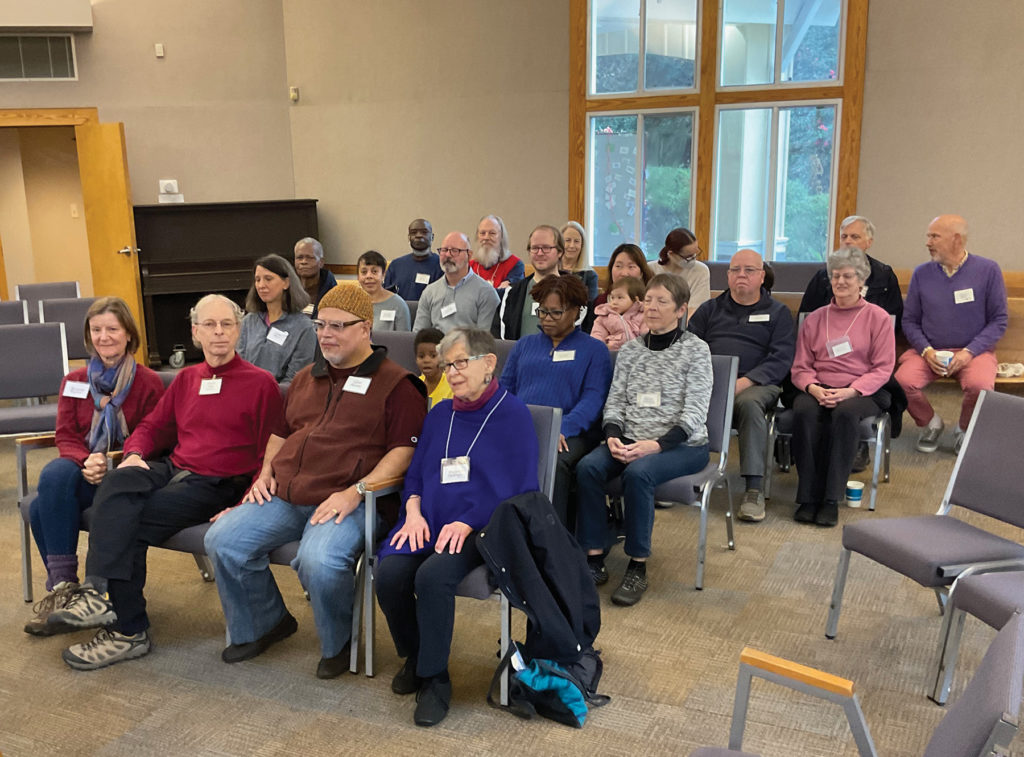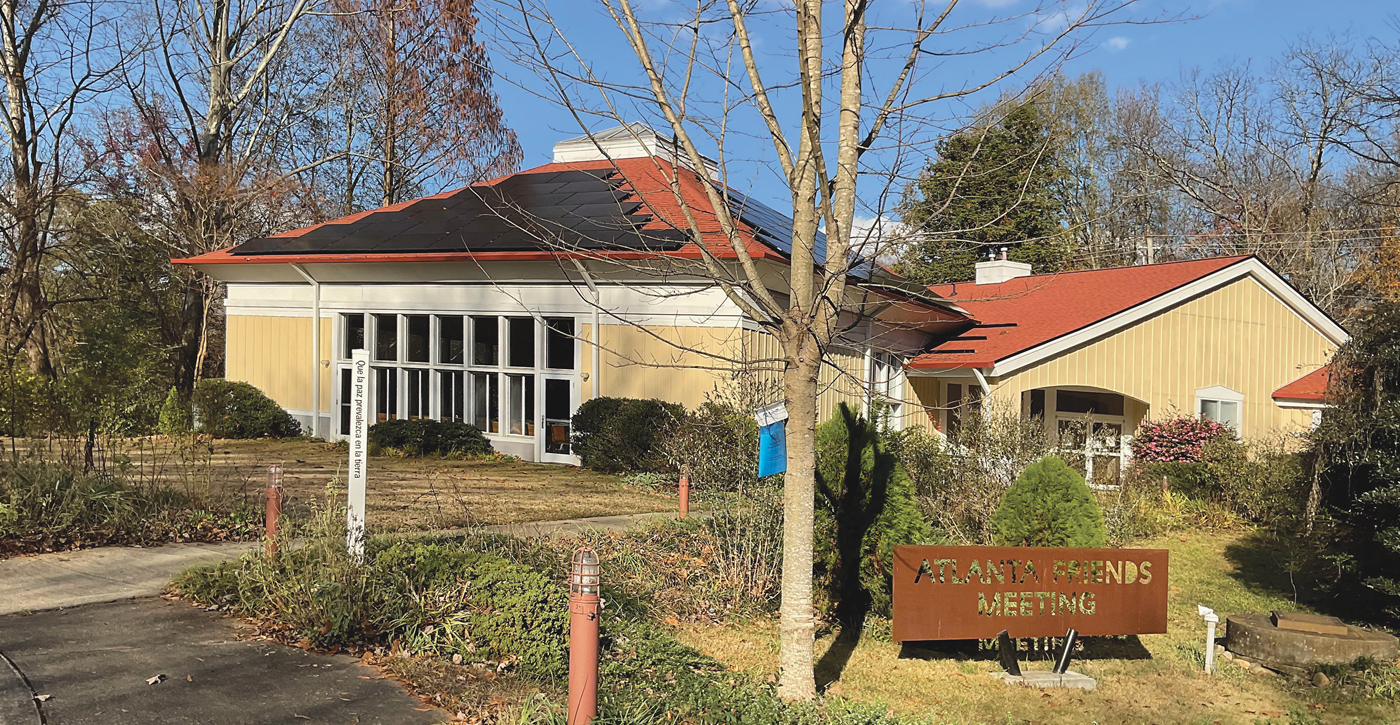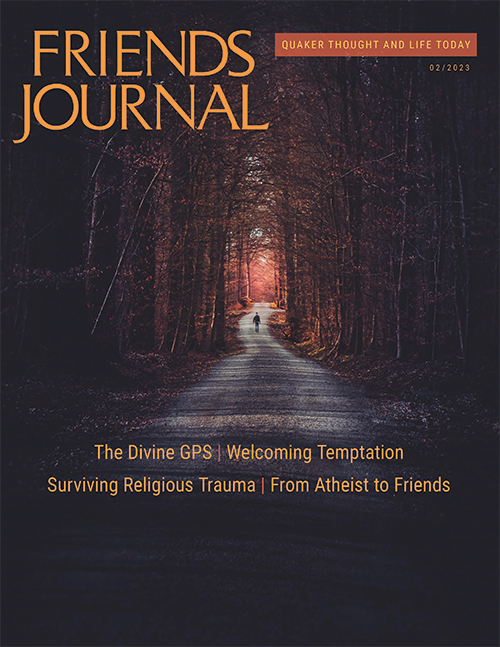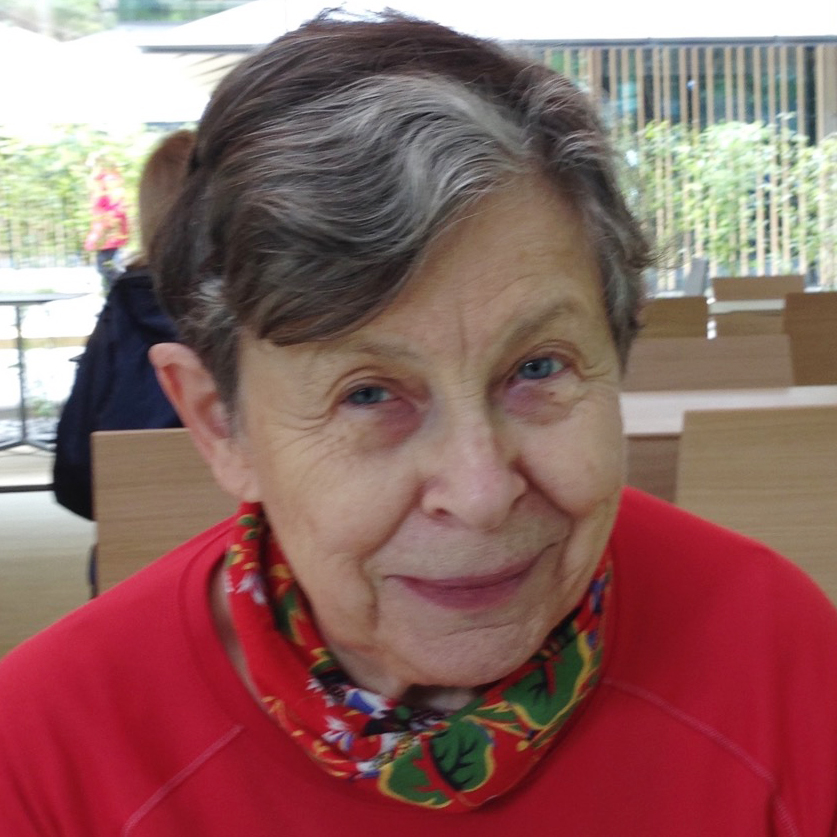Inviting Friends to Tell Their Stories
Only a few Friends sat in worship when I took my seat before 10:00 a.m. By the time I stood to close the worship, it looked like the room held the same number of Friends as there had been on a typical Sunday before the pandemic. I felt great joy and relief that we’ve not only survived but grown in strength and numbers. After a welcome and introduction, I said:
I sat and watched the room fill up this morning, reflecting on the many different paths and challenges we’ve experienced to be here. [I am not speaking of] just our travel here today but the turning points on our spiritual journeys that bring us to this community, this Quaker faith. And I am grateful that we can be together helping each other grow in faith and love.
On this Sunday last November I noticed that many were young adults, college students, and families with young children among the first-time attenders introducing themselves. Several longtime members were back for the first time since before the pandemic. Our introductions always include time for those who are attending online to introduce themselves, and we’ve discovered these introductions help those new to Friends have an easy way to see and hear who we are.
I saw this Sunday as another step on our path as a meeting to recover and become who we are now. Even as I celebrate our recovery, I recall those who are no longer with us. I look around the room, picture them in their usual seats, and remember how the gifts they brought laid the foundation for the meeting we are today. We recorded memorial minutes for six Friends in 2020, five in 2021, and eight in 2022.
All our meetings for worship and meetings with attention to business are hybrid now, occurring both online and in-person, and we are clear as a meeting that we will continue to welcome f/Friends in person and online. This makes us accessible to those at a distance and physically unable to attend, as well as to visitors seeking community.
Beyond initial introductions and a chat during post-worship coffee hour or in chat rooms online, how do we discover who we are as individuals of faith in a meeting community as we grow and change? One of the ways we do this is through sharing the story of the path we traveled to be here now.

Recent hybrid worship at Atlanta (Ga.) Meeting, with Zoom worshipers coming in on screen to the left (not shown). The author is in the front row, at right.
Since 2007, on the first Sunday of each month (including online during the pandemic), I’ve invited a Friend to speak, and we’ve enjoyed hearing the story of what brought the person to Friends and to this meeting. I send them a link to the article I wrote in 2013 for Friends Journal, “Telling Stories of Our Spiritual Journey,” which describes the history of this project and proposes the following questions to guide the speaker’s story:
- What were your early experiences with religion and lessons about God?
- How did that concept of God and religion change and grow as you began to understand these early lessons?
- What special life turning points brought you closer to or away from God?
- What influence did education, career, marriage, or children have on your faith and practice?
- How did you learn about Friends? What led you to this meeting?
- How has this meeting supported your spiritual journey?
- What do you believe now?
Each story adds to our oral history and is an affirmation that we are a home for seekers who are questioning what we’ve been taught.
These stories build upon the book As Way Opened: A History of Atlanta Friends Meeting, 1943–1997, which includes a Friend’s comment about the group’s early diversity and their wondering what they had in common, other than a desire not to be preached at. This early history was developed from a series of interviews with Friends who were our founding members; the interviews were conducted by a member who was a journalist, and another who was a historian who wrote about our place in Atlanta, Georgia, where we struggled to make a home that was open to all in the midst of segregation. The book helps me to see how we’ve stayed the same and yet grown. When we hear individual stories, we hear about our differences and similarities as we create an oral history for our meeting now.
The benefits of hearing and recording these stories go beyond creating an archive and history: every story tells me how much it helps speakers to see and tell others what has brought them here and what keeps them in this community.
It is a process of remembering and evaluating life events and their meaning, which sometimes provides new insights. I’m told by many that this is hard to do and needs time to season. This life review was hard for me, and I also see how this introspection is a lifelong process. Even once I’m clear, how do I describe the process to others, and what do I choose not to talk about? Some Friends decide not to speak; some decide to wait. Other Friends use this review to prepare their letter requesting membership, and some explain why they are not members.
Inviting Friends to share their stories is a ministry that I am called to because I know that when I tell my story, it not only helps me grow but builds our community of faith. And I love to listen. There is a child in all of us that likes to hear stories. When we sit together listening in reverent silence, we become one in the Spirit. Parker Palmer writes about creating a circle of trust, a safe space for the soul to show up. When we come ready to listen, we not only learn new things about the person speaking—even when we’ve known them for many years—but we also learn new things about ourselves and what we share.
When we come ready to listen, we not only learn new things about the person speaking—even when we’ve known them for many years—but we also learn new things about ourselves and what we share.
While this project began with a focus on stories of the elders, it now includes all ages. Many are younger and new to Friends, with at least one young adult Quaker Volunteer Service fellow from each class from 2012 to 2022. A young mother of a five- and a seven-year-old, who began attending in the summer of 2021, offered to tell her spiritual journey this past November. Her story is the most recent example of people finding their way to our meeting and who are willing to be recorded while telling us about their path. She was surprised to find that having 50 minutes without interruptions or questions helped her feel safe and welcomed.
An unexpected benefit of audio recordings of more than 100 stories over 15 years is our ability to listen again to the voice of a Friend who has passed. Hearing their recorded voices telling their spiritual journey helps us to hold them in our hearts, mourn their passing, and celebrate their gifts. We often include their own words in memorial minutes.
The recording is also shared with families who may not have heard the original telling, who often report that they learn things they hadn’t known. The most recent example is the recording of our Friend Muireann Brennan, who died unexpectedly at home in November. Muireann was due to retire in January 2023 from a long and extraordinary career as a doctor supporting emergency responses abroad with the Centers for Disease Control and Prevention. The purpose of this work was to improve the medical and living conditions of refugees affected by war and famine. Muireann was planning to move back to Dublin, Ireland, where she was born and her family still lives. She spoke to Atlanta Meeting in 2010 and in 2012 about her journey from Irish Catholic to Atlanta Quaker and the intersection of her faith and work. One of her sisters in Dublin told me how much the family appreciated hearing her story and sharing it across generations.
There is an abundance of gifts these stories offer to our meeting community, and we are grateful. We experience and celebrate continuing revelation as individuals when we tell Friends of our spiritual journey; when we listen to these stories as a meeting community; when we honor the lives of those who’ve passed; and when we share their stories within our meeting, and with friends and family outside the meeting.





Comments on Friendsjournal.org may be used in the Forum of the print magazine and may be edited for length and clarity.